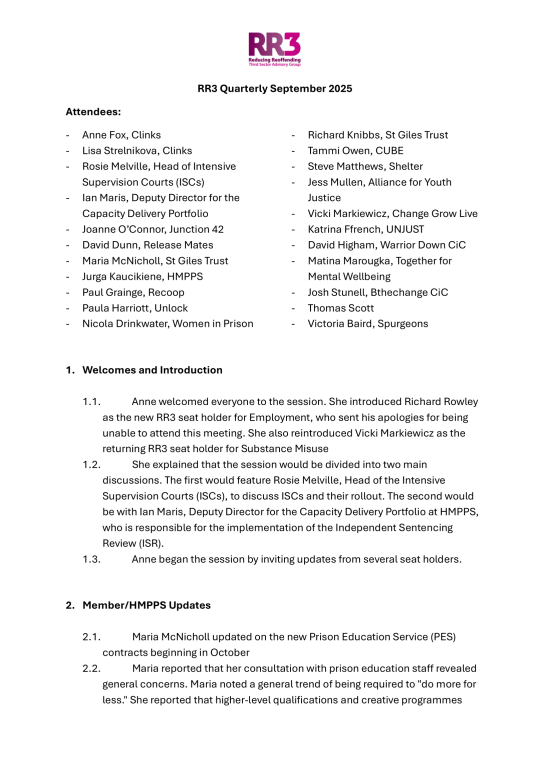This is the second in a series of blogs that give a detailed account of the experience of voluntary organisations working in criminal justice, focusing in the needs of their service users, their service delivery and their funding situation. The information has been edited from a selection of in-depth interviews that were conducted as part of our data collection for the state of the sector work. The blogs are from a range of organisations to represent the diversity of voluntary organisations working in criminal justice. We have protected organisations anonymity to allow them to speak freely.
“We want to be the best we can”The interviewee has worked for the organisation since 2013.
What are the needs of your service users and how are you responding?
Our organisation works in criminal justice and the immigration system. We provide specialist support to Foreign National, Black, Asian and Minority Ethnic (BAME) people who are in contact with the criminal justice system and immigration systems. Some of the needs of our clients that have changed are due to issues including increased poverty, anxiety in relation to immigration status, challenges accessing housing and accommodation, the increasingly hostile environment for migrants and changes to legal aid. People are more anxious about what is going to happen to them in the community. There is also a reduction in funding available for voluntary organisations which has led to increased competition between them but has also led to some services raising their thresholds for support and narrowing their offer.
What does your overall funding situation look like?
We are a small organisation and our income is mostly based on grants but we also sometimes receive small donations from individuals. Half of our income is from a government grant and we also receive grant funding from some charitable trusts and foundations. It’s hard to find the time to write bids and build relationships with funders and we have less time for other project and development work because of fundraising.
In response to the changing needs of our service users and due to the reduction in resources organisations have, including those in the voluntary and statutory sector, we are trying to find ways to work more collaboratively and in partnership to be creative with the resources that we have. This is especially the case as some organisations that we used to work closely with have ceased to exist due to a lack of funding, or they are more restricted in the work they do. We take a partnership approach to our work, but we are mindful that with the lack of funding opportunities, that actually people we have worked more collaboratively with in the past are now our competitors.
We deliver work in prisons, but that has changed recently because prisons used to have a budget to pay us directly but now it is more difficult to secure funding for this type of work. We have written numerous bids to fundraise for our work in prisons but so far our applications have not been successful, which makes it challenging to continue to have a presence in the number of prisons that we work in. Funding for our work in immigration removal centres is less challenging.
Charitable trusts and foundations do support our charitable work and we hope to further develop our grant funded work.
Our work in the community has grown considerably in recent years and we’ve received a new five-year grant to support this work. We have a dedicated base which enables us to deliver that work. Since we started this work we have seen a big increase in the number women referred to us who have been trafficked. Our trafficking work cuts across all the other areas of our work; we identify women in prison, in immigration removal centres or in the community that have been trafficked. We are currently not funded specifically to do that work which can be some of our most challenging work.
What challenges or opportunities is your organisation facing in the future?
The work that has always been challenging and continues to be challenging, but it is becoming more so. The needs of our clients have always been complex, but again they are becoming more so which means that there is a broader range of issues our case workers have to deal with. This in turn means that they need to have more expertise to support our clients. There is also an impact on the stress and psychological issues staff have to deal with.
There is a competitive environment between other organisations in the sector and I feel that there is starting to be a bit of mistrust between organisations.
Across the sector, I noticed that people are very stretched, including at Project Manager or Senior Management level and a lot continues to be asked of the sector. I suppose there is sometimes a feeling of people being tired and crushed by how much we do. At the same time our staff and volunteers have lots of ideas and we want to be the best we can and be as creative as we can be to continue support our clients who are in extremely difficult situations.
-----------------------------------------------------------------------------------------
Join us for the launch of the State of the Sector Report 2017 on the 12th July to discuss this year’s findings, network with others working in criminal justice and inform Clinks’ future work.
Book your place here
What's new
Blogs
Homelessness Strategy Blog
Publications
Latest on X
The role is for a leader from an organisation focused on racially minoritised people, with expertise in service delivery, policy, advocacy, or related areas in criminal justice. Racial disparities are present at every CJS stage. This role ensures these voices are central in shaping policy to help address and eradicate them. Apply by Mon 18 Nov, 10am. More info: https://www.clinks.org/voluntary-community-sector/vacancies/15566 #CriminalJustice #RR3 #RacialEquity

